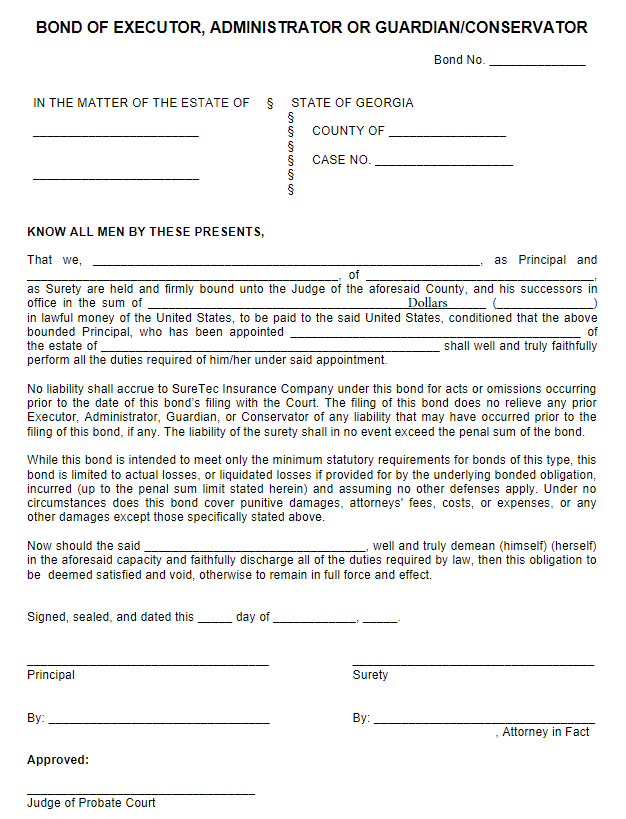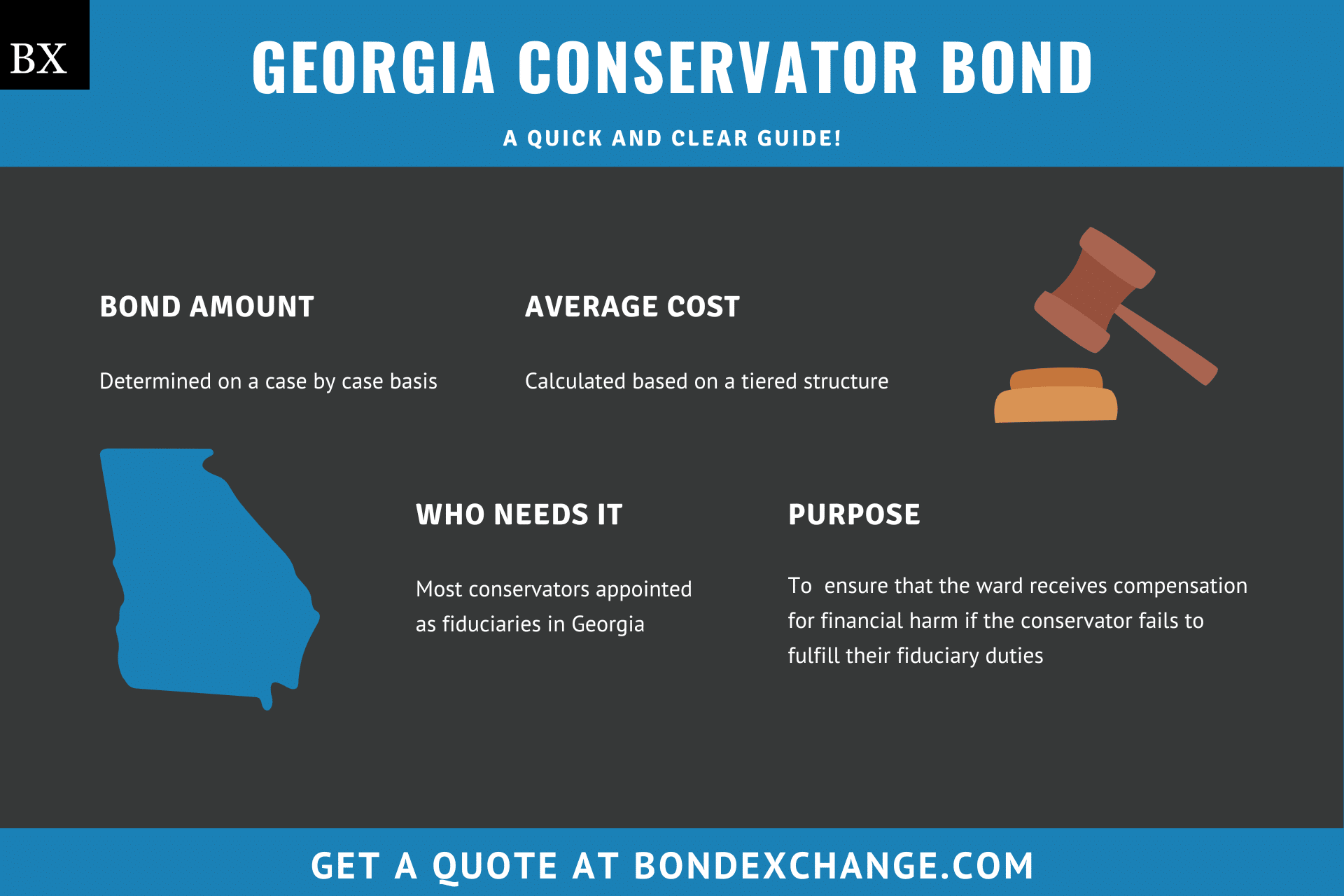Georgia Conservator Bond: A Comprehensive Guide
This guide provides information for insurance agents to help their customers obtain a Georgia Conservator bond. For information on the bonding requirements for Guardians in Georgia, click here.
At a Glance:
- Average Cost: Calculated based on a tiered structure
- Bond Amount: Determined on a case-by-case basis (more on this later)
- Who Needs It: Most conservators appointed as fiduciaries in Georgia
- Purpose: To ensure the ward receives compensation for financial harm if the conservator fails to fulfill their fiduciary duties
- Who Regulates Conservator Bonds in Georgia: The probate court with jurisdiction over where the ward resides or has property

Background
Georgia Code 29-3-24 and 29-5-25 require conservators to be appointed by a court and swear an oath before assuming their fiduciary duties. The Georgia legislature enacted the appointment requirement to ensure that conservators act in the ward’s best interests when managing their estate. To provide financial security for the enforcement of this requirement, most conservators must purchase and maintain a probate surety bond before becoming appointed as a fiduciary.
What is the Purpose of the Georgia Conservator Bond?
Georgia requires most conservators to purchase a surety bond as a prerequisite to being appointed as a fiduciary over the estate of a ward. The bond ensures that the ward will receive compensation for financial harm if the conservator fails to abide by the regulations outlined in Georgia Code 29-3-40 and 29-5-40. Specifically, the bond protects the ward if the conservator fails to adhere to all court orders or mismanages the estate’s assets.
For example, if a conservator uses money from a ward’s bank account to pay for the conservator’s personal expenses or mixes the ward’s funds with their own, the ward can file a claim against the conservator’s bond to recoup their losses. In short, the bond is a type of insurance in favor of the ward if the conservator does not fulfill their fiduciary duties.
How Can an Insurance Agent Obtain a Georgia Conservator Bond?
BondExchange makes obtaining a Georgia Conservator bond easy. Simply log-in to your account and use our keyword search to find the “Conservator” bond in our database. Don’t have a login? Gain access now and let us help you satisfy your customers’ needs. Our friendly underwriting staff is available by phone (800) 438-1162, email or chat from 7:30 AM to 7:00 PM EST to assist you.
At BondExchange, our 40 years of experience, leading technology, and access to markets ensures that we have the knowledge and resources to provide your clients with fast and friendly service whether obtaining quotes or issuing bonds.
Not an agent? Then let us pair you with one!

Click the above image to find a BX Agent near you
How is the Bond Amount Determined?
Georgia Code 29-3-41 and 29-5-41 dictate that the bond amount must be equal to the estimated value of the ward’s personal property If the estate sells any real property, the income from the sale must be included in the valuation of the ward’s estate.
Can the Bond Amount be Adjusted?
Yes, as Georgia Code 29-3-42 and 29-5-42 allow the court to adjust the bond amount to reflect a change in the value of the ward’s estate. Additionally, Georgia Code 29-3-43 and 29-5-43 permit the court to increase the required bond amount as they see fit.
What are the Underwriting Requirements for the Georgia Conservator Bond?
Most surety companies will examine the following factors when determining eligibility for the Georgia Conservator bond:
- Conservator’s credit history
- Whether or not the estate has an attorney
- Whether or not the conservator is a family member
- The conservator’s occupation
- Whether or not the conservator is replacing a prior fiduciary
- If the conservator has ever committed a felony
- Whether or not there is any ongoing business in the estate
- If a creditor is requiring the bond
- If the bond amount is greater than or equal to the estate’s value
How Much Does the Georgia Conservator Bond Cost?
Surety companies typically determine the premium rate for Conservator bonds based on a tiered structure, so larger bond amounts will be charged a lower premium rate than smaller bonds. Georgia Code 29-3-44 and 29-5-44 allow for the ward’s estate to pay for the cost of the bond.
The following table illustrates the pricing structure for the Georgia Conservator bond:
$1,500,000 Conservator Bond Cost
| Bond Amount | Premium Rate | Total Bond Cost |
|---|---|---|
| First $20,000 | 0.75% | $150 |
| Next $40,000 | 0.60% | $240 |
| Next $140,000 | 0.50% | $700 |
| Next $300,000 | 0.375% | $1,125 |
| Next $1,000,000 | 0.25% | $2,500 |
| Total cost of $4,715 |
Who is Required to Purchase the Bond?
Georgia requires conservators to purchase a surety bond as a prerequisite to becoming a court-appointed fiduciary. To paraphrase Georgia Code 29-1-1, a “conservator” is an individual appointed as a fiduciary to manage a ward’s estate and financial affairs. Likewise, a “ward” is defined as a minor or adult for whom a conservator has been appointed that is incapable of making sound decisions concerning their finances.
Conservators are not required to purchase a bond if they are a financial institution, a trust company, a national or state bank, or a savings and loan association and its combined capital and profits are greater than $3 million. Testamentary conservators (conservators appointed in a parent’s will) are not required to obtain a surety bond.

How do Georgia Conservators Become Appointed as Fiduciaries?
Conservators in Georgia must navigate several steps to become appointed as fiduciaries. Below are the general guidelines for conservators, but appointees should refer to the appointment statutes or the state’s conservator handbook for details on the process.
Conservator of a Minor/Child
Step 1 – Hire an Attorney
Although not explicitly required, it is highly recommended that conservators hire an attorney to assist with the appointment process.
Step 2 – Determine Priority
Priority to serve as a conservator is granted in the following order:
-
- An individual nominated by the ward if the ward is at least 14 years of age
- The nearest adult relative of the ward
- Adult relatives of the minor
- A person designated in writing by the ward’s natural guardian
- A person who has cared for the ward or a person the ward has lived with
- The county guardian
The court desires to appoint the conservator best suited for the ward and may choose to appoint a person without priority.
Step 3 – File a Petition for Appointment
Persons seeking a conservatorship over a minor must file a petition for appointment with the probate court with jurisdiction over where the minor resides. Conservators can obtain the petition from the probate court, and must include the following information:
-
- Personal information of the minor and their relatives
- Personal information about the person seeking conservatorship
- General statement and evaluation of the person’s estate and property
- The reason for the petition for appointment
A person is disqualified from being appointed as a conservator if they themselves are a minor, ward, or protected person, or if there is a conflict of interest between the potential conservator and minor.
Step 4 – Attend a Hearing
Conservators must attend a hearing conducted by the probate court and present evidence as to why the minor is in need of conservatorship. The court will examine the evidence presented by the conservator as well as that presented by the minor being evaluated (if any) and make a determination as to whether or not conservatorship is necessary.
If the court finds a basis for the appointment, it will issue a letter of conservatorship to the petitioner. The conservator must also take an oath with the judge or clerk of the probate court prior to beginning their fiduciary duties.
Step 5 – Purchase a Surety Bond
Unless otherwise directed by the court, conservators must purchase and maintain a surety bond (limits outlined above).
Conservator of an Incompetent Adult
Step 1 – Hire an Attorney
Although not explicitly required, it is highly recommended that conservators hire an attorney to assist with the appointment process.
Step 2 – Determine Priority
Priority to serve as a conservator is granted in the following order:
-
- An individual nominated by the ward
- The spouse of the ward or their nominee
- The adult child of the ward or their nominee
- A parent of the ward or their nominee
- A conservator appointed for the ward when they were a minor
- A conservator previously appointed in Georgia or another state
- A friend, relative, or any other person
- The county guardian
The court desires to appoint the conservator best suited for the ward and may choose to appoint a person without priority.
Step 3 – File a Petition for Appointment
Persons seeking a conservatorship over an adult’s estate must file a petition for appointment with the probate court with jurisdiction over where the adult resides or has property. Conservators can obtain the forms from the probate court handling the case. Conservators must also ensure they have the petition sworn by either two or more petitioners, or have the petition supported by an affidavit from a physician, psychologist, or licensed social worker. A person is disqualified from being appointed as a conservator if they:
-
- Are a minor, a ward, or a protected person
- Have a conflict of interest with the ward unless the court determines it is unsubstantial
- Are an owner, operator, or employee of a long-term care facility where the ward receives care.
Step 4 – Attend a Hearing
Conservators must attend a hearing conducted by the probate court and present evidence as to why the adult is in need of conservatorship. The court will examine the evidence presented by the conservator as well as that presented by the adult being evaluated (if any) and make a determination as to whether or not conservatorship is necessary.
If the court finds a basis for the appointment, it will issue a letter of conservatorship to the petitioner. The conservator must also take an oath with the judge or clerk of the probate court prior to beginning their fiduciary duties.
Step 5 – Purchase a Surety Bond
Unless otherwise directed by the court, conservators must purchase and maintain a surety bond (limits outlined above).
How do Georgia Conservators File Their Bonds?
Conservators should file their completed bond forms, including the power of attorney, with the clerk of the probate court with jurisdiction over where the ward resides or has property.
The surety bond requires signatures from the company that issues the bond, the applicant, and the judge presiding over the case. The surety company should include the following information on the bond form:
- Legal name of the entity/individual(s) buying the bond
- Surety company’s name and address
- Legal name of the ward
- County of the probate court and case number
- Bond amount
- Fiduciary title
- Date the bond is signed
What can Georgia Conservators do to Avoid Claims Made Against Their Bonds?
To avoid claims against their bonds, conservators in Georgia must ensure that they:
- Perform all of their fiduciary duties
- Obey all court orders
- Do not mismanage the estate’s assets
